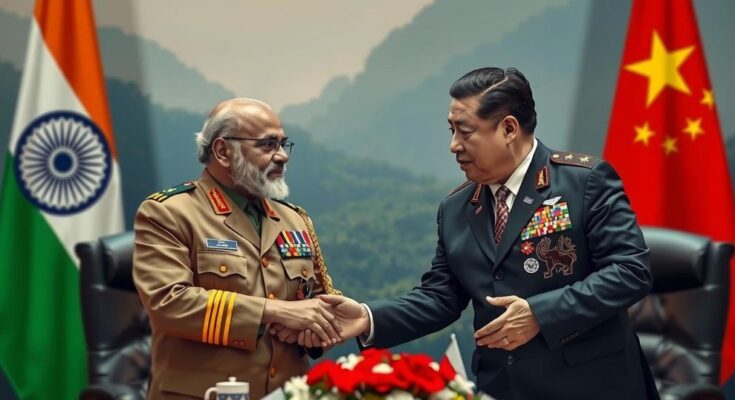Indian Defence Minister Rajnath Singh and Chinese Defence Minister Dong Jun held productive talks in Laos, agreeing to develop a roadmap to rebuild trust post-2020 border clashes. The meeting follows troop disengagement in Eastern Ladakh and emphasizes cooperation for global peace and prosperity. Singh and Dong highlighted the need to prevent future conflicts and enhance bilateral ties.
On Wednesday, during a meeting in Vientiane, Laos, Indian Defence Minister Rajnath Singh and Chinese Defence Minister Admiral Dong Jun engaged in discussions aimed at fostering mutual trust. They agreed on developing a roadmap to rebuild confidence following the tensions stemming from the 2020 border clashes. This dialogue occurred alongside the completion of troop disengagement in eastern Ladakh and marks a significant advancement in bilateral relations between the two nations. Singh emphasized the importance of amicable relations that contribute positively to global peace and prosperity. He urged a focus on cooperation instead of conflict, highlighting the need to reflect on the lessons learned from past confrontations. The meeting, characterized as “extremely productive” by Singh, underscored the necessity of preventing recurrences of border clashes and ensuring peaceful interactions along the India-China frontier. Earlier discussions between Indian External Affairs Minister S. Jaishankar and Chinese Foreign Minister Wang Yi also indicated progress, focusing on enhancing ties through collaborative efforts, such as resuming the Kailash Mansarovar Yatra and exchanging data on trans-border rivers. Both parties agreed to conduct a meeting concerning their Special Representatives soon. The backdrop of these dialogues involves a recent history of deteriorating ties post the 2020 Galwan Valley clash, which severely impacted bilateral relations. After numerous negotiations, disengagement of troops in the sensitive areas of Demchok and Depsang was successfully initiated, allowing for renewed patrol operations after a prolonged hiatus. During his three-day visit, Defence Minister Singh also engaged in separate meetings with his counterparts from Laos and Malaysia, within the framework of the ASEAN Defence Ministers’ Meeting Plus, underscoring India’s commitment to regional security and collaboration.
The discussion between the defence ministers of India and China follows a period marked by heightened tensions due to border military clashes, notably the fatal clash in Galwan Valley in 2020. Since then, efforts have been made to resolve the longstanding border standoff. The recent troop disengagement in eastern Ladakh is a part of broader efforts to stabilize relations and foster cooperation between the two nations, which are among the largest in the world. Rebuilding trust is essential for peace in the region and has implications beyond bilateral relationships, potentially influencing global stability.
The recent meeting between Indian and Chinese defence ministers represents a significant step toward improving bilateral relations, grounded in the mutual recognition of the need for trust and cooperation. By learning from the challenges of the past, both nations express a commitment to ensuring peace and stability along their shared border. Continued dialogue and cooperation are vital for fostering a secure and prosperous future for both countries and the region.
Original Source: www.hindustantimes.com




